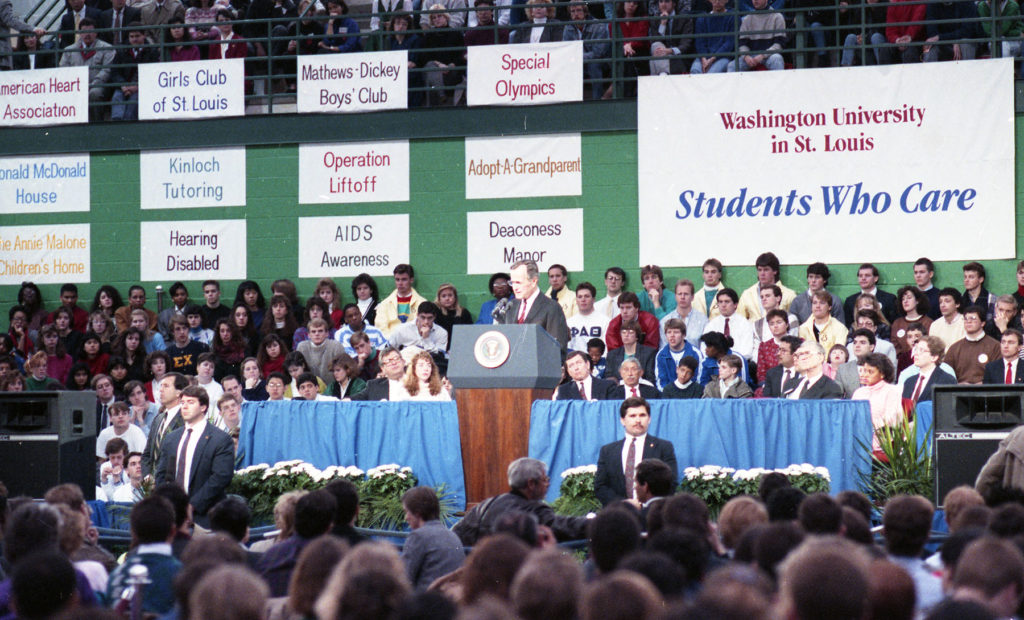
As the country pays homage to the memory of President George H.W. Bush, Washington University in St. Louis recalls three memorable visits: when he delivered a “Thousand Points of Light” speech on the Danforth Campus in 1989; when he returned for the first presidential debate in 1992; and when he gave the keynote address at the university’s Founders Day in 1999.
President Bush, who died Nov. 30, 2018, at the age of 94, delivered a major national address on student volunteerism Feb. 17, 1989, in the Athletic Complex Field House to an audience of approximately 4,000.
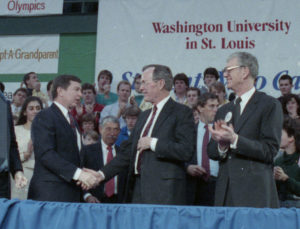
The talk marked his first appearance at a university campus since he had taken office Jan. 20 as the 41st president of the United States. The visit was the first time that a president had been on the Washington University campus while in office.
He was back in the Field House Oct. 11, 1992, when he participated in the first nationally televised three-candidate presidential debate featuring him, Arkansas Gov. Bill Clinton and Reform Party candidate Ross Perot.
During that 90-minute debate before a live audience of 600, including 250 Washington University students, and a televised audience of more than 100 million, the presidential candidates addressed topics such as military spending and the candidates’ patriotism.
President Bush also gave the university’s Founders Day address Oct. 30, 1999, at America’s Center in downtown St. Louis. Earlier that day, he was on campus for a question and answer session in Holmes Lounge with student leaders and 100 other students who won a lottery.
Recalling this visit, Chancellor Mark S. Wrighton noted “that the president was gracious, engaged and inspirational. He was very accessible, and he clearly enjoyed his visit with members of the Washington University community, particularly the students. It was an honor to be able to host him as our Founders Day speaker.”
His ties to the university extend beyond his campus talks and the presidential debate. His grandfather, George Herbert Walker Sr., whom he was named after, graduated from the Washington University School of Law in 1897. His mother, Dorothy Walker Bush, attended Mary Institute, which at the time was operated by the university.
Shining ‘Thousand Points of Light’
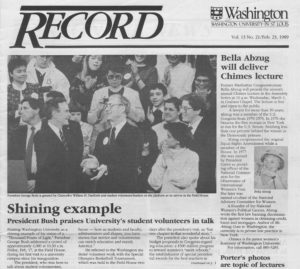
During his 1989 Field House speech, President Bush recognized the efforts of the numerous student volunteers at Washington University, 680 of whom were given special seating at the speech. In addition to the Field House audience, 700 more watched on a closed-circuit television in Edison Theatre.
The university was chosen for his first campus-based “Thousand Points of Light” speech as president because his staff had read a 1987 Washington University Magazine story, titled “The Rise of Volunteerism.”
Written by Trudi Spigel, PhD ’69, then director of special projects in public relations, the Magazine story highlighted how at least 90 percent of Washington University students were involved in some kind of altruistic activity that year.
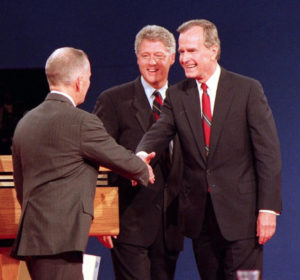
The story dovetailed perfectly with a theme from his presidential campaign in which he supported increasing volunteerism across America as a way of improving society.
President Bush told the Field House crowd, “If we take this spirit evident in this gym here today and then multiply it by those thousands, we can do the job.”
Washington University student volunteers were seated directly in front of and directly behind the presidential stage. A large banner, stating “Washington University in St. Louis — Students Who Care,” hung behind the president, and the walls of the gymnasium were covered with smaller banners signifying the many student volunteer efforts on campus.
Bush, noting the banners, said, “These symbols, these signs around this room, I think sum up what I talk about when I talk about ‘a thousand points of light.’ It is neighbor helping neighbor, it is kid helping kid, it is friends holding out their hand to other friends.”
Calling Washington University a “university of excellence,” President Bush also praised the university’s academic achievements. “Your community has built a pioneering effort in science and math,” he said.
“Your teaching, research and soaring admission applications tell a story summed up best by two words — academic excellence.
“But there’s another side of it, another side of the story that Washington University has to tell — a story from which all America can learn. It’s a story about investing in America’s future — how as students and faculty, administrators and alumni, you have shown that service and volunteerism can enrich education and enrich America.”
He referred to the students’ volunteer work with the Special Olympics Basketball Tournament, which was held in the Field House two days after the president’s visit, as “but one chapter in that wonderful story.”
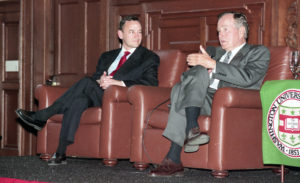
The president was introduced to the audience, which included some 150 members of the national and local media, by then Chancellor William H. Danforth. “What an honor it is to welcome the president to Washington University in St. Louis,” Danforth said. “And what a privilege it is to introduce to the president a large sample of the Washington University community.”
Danforth told the president that Washington University students are a “vital, energetic and imaginative group,” many of whom volunteer their time and efforts in service to others. Danforth also commended the president’s commitment to volunteerism, as he compared him to another president named “George.”
“Like President Washington, whose name our institution bears,” Danforth said, “President Bush comes to his responsibility from a background of service and brings with him a dedication to the nation and its people.”
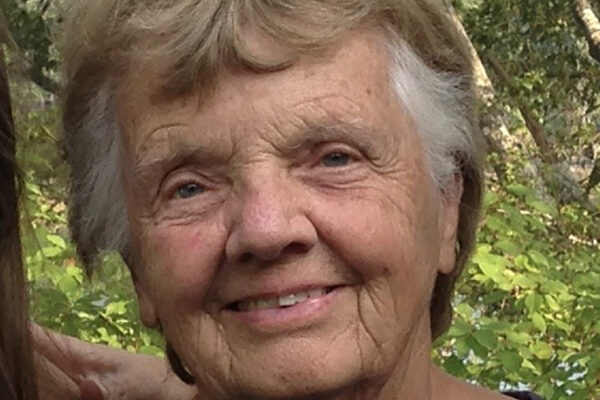


Comments and respectful dialogue are encouraged, but content will be moderated. Please, no personal attacks, obscenity or profanity, selling of commercial products, or endorsements of political candidates or positions. We reserve the right to remove any inappropriate comments. We also cannot address individual medical concerns or provide medical advice in this forum.